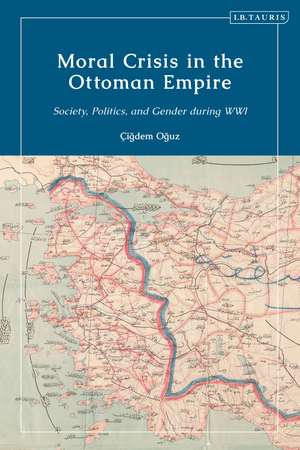Moral Crisis in the Ottoman Empire: Society, Politics, and Gender during WWI
Autor Dr Çigdem Oguzen Limba Engleză Paperback – 28 dec 2022
| Toate formatele și edițiile | Preț | Express |
|---|---|---|
| Paperback (1) | 191.56 lei 6-8 săpt. | +71.34 lei 7-13 zile |
| Bloomsbury Publishing – 28 dec 2022 | 191.56 lei 6-8 săpt. | +71.34 lei 7-13 zile |
| Hardback (1) | 569.22 lei 6-8 săpt. | |
| Bloomsbury Publishing – 16 iun 2021 | 569.22 lei 6-8 săpt. |
Preț: 191.56 lei
Preț vechi: 249.48 lei
-23% Nou
Puncte Express: 287
Preț estimativ în valută:
36.66€ • 38.13$ • 30.68£
36.66€ • 38.13$ • 30.68£
Carte tipărită la comandă
Livrare economică 15-29 martie
Livrare express 08-14 februarie pentru 81.33 lei
Preluare comenzi: 021 569.72.76
Specificații
ISBN-13: 9780755642533
ISBN-10: 0755642538
Pagini: 248
Dimensiuni: 156 x 234 x 25 mm
Greutate: 0.35 kg
Editura: Bloomsbury Publishing
Colecția I.B.Tauris
Locul publicării:London, United Kingdom
ISBN-10: 0755642538
Pagini: 248
Dimensiuni: 156 x 234 x 25 mm
Greutate: 0.35 kg
Editura: Bloomsbury Publishing
Colecția I.B.Tauris
Locul publicării:London, United Kingdom
Caracteristici
Challenges narrative of a fundamental asymmetry between an active, developed Europe and a stagnant, undeveloped Ottoman Empire
Notă biografică
Çigdem Oguz is a research fellow at the University of Bologna, Department of History and Cultures, Italy. Previously, she worked as a postdoctoral researcher at the University of Naples Federico II, Department of Humanities, Italy. Her research interests include late Ottoman social and intellectual history and state-society relations, religious communities in the Ottoman Empire, citizenship studies, war studies, and women and gender in the Middle Eastern context.
Cuprins
1 Introduction2 Intellectual contests over morality,and interpretations of "moral crisis": secular morality vs. religious morality3 Public morals, prostitution, and cultural perceptions 4 Morality between discourse and daily realities5 The family at the center of moral decline: legislation targeting the regeneration and protection of Ottoman Muslim families6 Conclusion: the legacy of morality debates today Bibliography
Recenzii
The author has successfully grasped a complex and abstract concept. ... a seminal exploration of women's issues and society during World War I in the Ottoman Empire.
Moral Crisis in the Ottoman Empire provides a useful framework and contribution in this field of study, and will certainly prompt discussions and further research.
Moral Crisis in the Ottoman Empire is based on rich archival research and contributes to a growing literature on the histories of gender and sexuality during the First World War. By placing 1914-18 developments into the longue durée of Ottoman history, Oguz can identify shifts and continuities in the histories of policing, state-civilian relations, gender hierarchies, religious authority, and moral panics.
'Based on a broad array of original sources, this timely study gives us a full and multi-layered picture of the debates on, and realities of, the issue of public morality in the Ottoman Empire during World War l, an issue that was crucial to its legitimacy as an Islamic empire.'
'A brilliant book of social and cultural history on an under researched topic. Focusing on discussions on moral decline and Muslim identity and exploring policies on gender and family, Oguz provides us with an original and long-awaited analysis of the Ottoman home front during WWI and the sociocultural transformation it entailed.'
'By using a sound empirical data from the Ottoman World War I years, this book, I believe, is a great contribution to understand how and why times of competing visions of morality and increasing discourse on moral crisis reflect the state of a society in crisis, decay, turmoil and transformation.'
Moral Crisis in the Ottoman Empire provides a useful framework and contribution in this field of study, and will certainly prompt discussions and further research.
Moral Crisis in the Ottoman Empire is based on rich archival research and contributes to a growing literature on the histories of gender and sexuality during the First World War. By placing 1914-18 developments into the longue durée of Ottoman history, Oguz can identify shifts and continuities in the histories of policing, state-civilian relations, gender hierarchies, religious authority, and moral panics.
'Based on a broad array of original sources, this timely study gives us a full and multi-layered picture of the debates on, and realities of, the issue of public morality in the Ottoman Empire during World War l, an issue that was crucial to its legitimacy as an Islamic empire.'
'A brilliant book of social and cultural history on an under researched topic. Focusing on discussions on moral decline and Muslim identity and exploring policies on gender and family, Oguz provides us with an original and long-awaited analysis of the Ottoman home front during WWI and the sociocultural transformation it entailed.'
'By using a sound empirical data from the Ottoman World War I years, this book, I believe, is a great contribution to understand how and why times of competing visions of morality and increasing discourse on moral crisis reflect the state of a society in crisis, decay, turmoil and transformation.'
